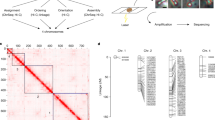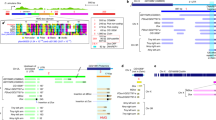Abstract
MRS. SEXTON'S recent criticism1 of my views on the above subject gives me an opportunity of citing further evidence in their favour. So far as I can see, only three explanations of the appearance of the anomalous black-eyed individual (for particulars see my previous note2) are possible: that a reverse mutation had occurred, that the individual had been accidentally introduced owing to careless technique, and the one advanced at the time (fertilisation of a single egg by sperm persisting from a previous mating).
This is a preview of subscription content, access via your institution
Access options
Subscribe to this journal
Receive 51 print issues and online access
$199.00 per year
only $3.90 per issue
Buy this article
- Purchase on Springer Link
- Instant access to full article PDF
Prices may be subject to local taxes which are calculated during checkout
Similar content being viewed by others
References
E. W. Sexton, NATURE, 136, 477, Sept. 21, 1935.
K. W. Yarnold, NATURE, 135, 832; 1935.
Author information
Authors and Affiliations
Rights and permissions
About this article
Cite this article
YARNOLD, K. Persistence of Sperms to a Later Mating in Gammarus. Nature 136, 758–759 (1935). https://doi.org/10.1038/136758b0
Published:
Issue Date:
DOI: https://doi.org/10.1038/136758b0
Comments
By submitting a comment you agree to abide by our Terms and Community Guidelines. If you find something abusive or that does not comply with our terms or guidelines please flag it as inappropriate.



